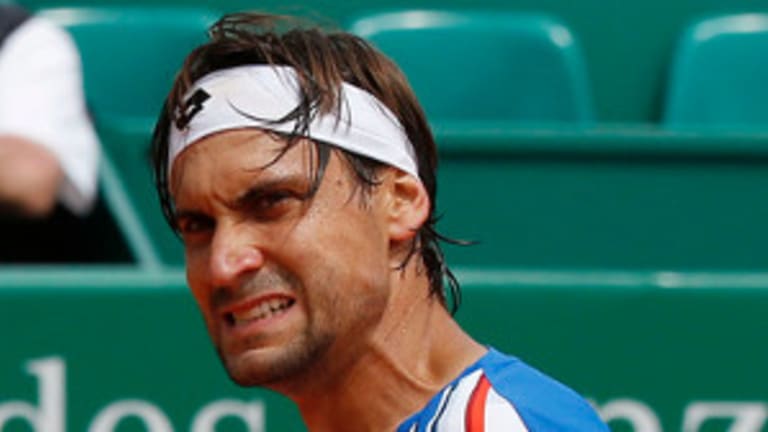Looking at it on paper, there hardly seemed to be a reason for Rafael Nadal and David Ferrer to bother playing their quarterfinal in Monte Carlo on Friday. The last time Nadal had lost to his countryman on clay was back in 2004, in the first of their 26 career meetings. And in that same span of time, Rafa had amassed a 50-2 record, and eight titles, at this, his favorite tournament. We knew it would be tough, we knew it would be a grind, we knew it would took some time, we knew Ferrer might even have a chance or two, but we knew that Nadal would end up the winner.
All of those things turned out to be true except the last one, as Ferrer improved his record on clay against Nadal to 2-17 with a surprising 7-6 (1), 6-4 win. In fact, if you hadn’t known anything about the two players, you might have thought that Ferrer was the favorite and Nadal was the one who couldn’t quite make himself believe that he could beat this opponent.
Rafa was uncharacteristically subdued throughout, and he saved his worst, least confident tennis for the most crucial 10 minutes of the match, the first-set tiebreaker. Hanging his head and playing tentatively, he virtually conceded the breaker after falling behind early. At 1-4, Nadal had a chance to take a rip at his favorite shot, an inside-out forehand, from on top of the baseline. Instead, he tried to thread a risky drop shot; too risky, it turned out, as the ball caught the tape and fell back. The shot selection, the execution, the demeanor: None of it was what we've come to expect from Rafa at these stages.
What we usually expect from a match between these two is an elemental battle of wills. Ferrer grinds, until you think no one could possibly have the mental endurance to stay with him—nobody except Nadal, that is. Rafa’s superior shotmaking always gives him the last word. Today, though, Nadal didn’t have those shots; he finished with 24 winners and 44 unforced errors, his backhand was short and often shanked, and at the moment in the first set when he appeared ready to come up with something special, he came up with something pedestrian instead.
Serving at 5-5, Ferrer went from being ahead 40-15 to down a break point. The two engaged in a long rally, and both ended up at the net. With an opening for a backhand pass, Rafa slid forward and...chipped the ball right to Ferrer, who volleyed it away for a winner and eventually held. The usual roles between these two had been reversed.
Beyond that moment, though, it didn’t seem that Nadal had the psychological endurance to grind with Ferrer today. Rafa mustered his share of fist-pumps and his cries of "Vamos!", but they tended to come after the crucial points had been lost, when he was just trying to hang on. This time, when Ferrer, who squandered an early break in the first set and a late break in the second, gave him an opening, Rafa didn't take it. Perhaps 10 years of wins over Ferrer on clay, and eight titles at Monte Carlo, had finally sapped a little of Nadal’s motivation. You can only keep a Little Beast at bay for so long, and Rafa has done it for a long time.
